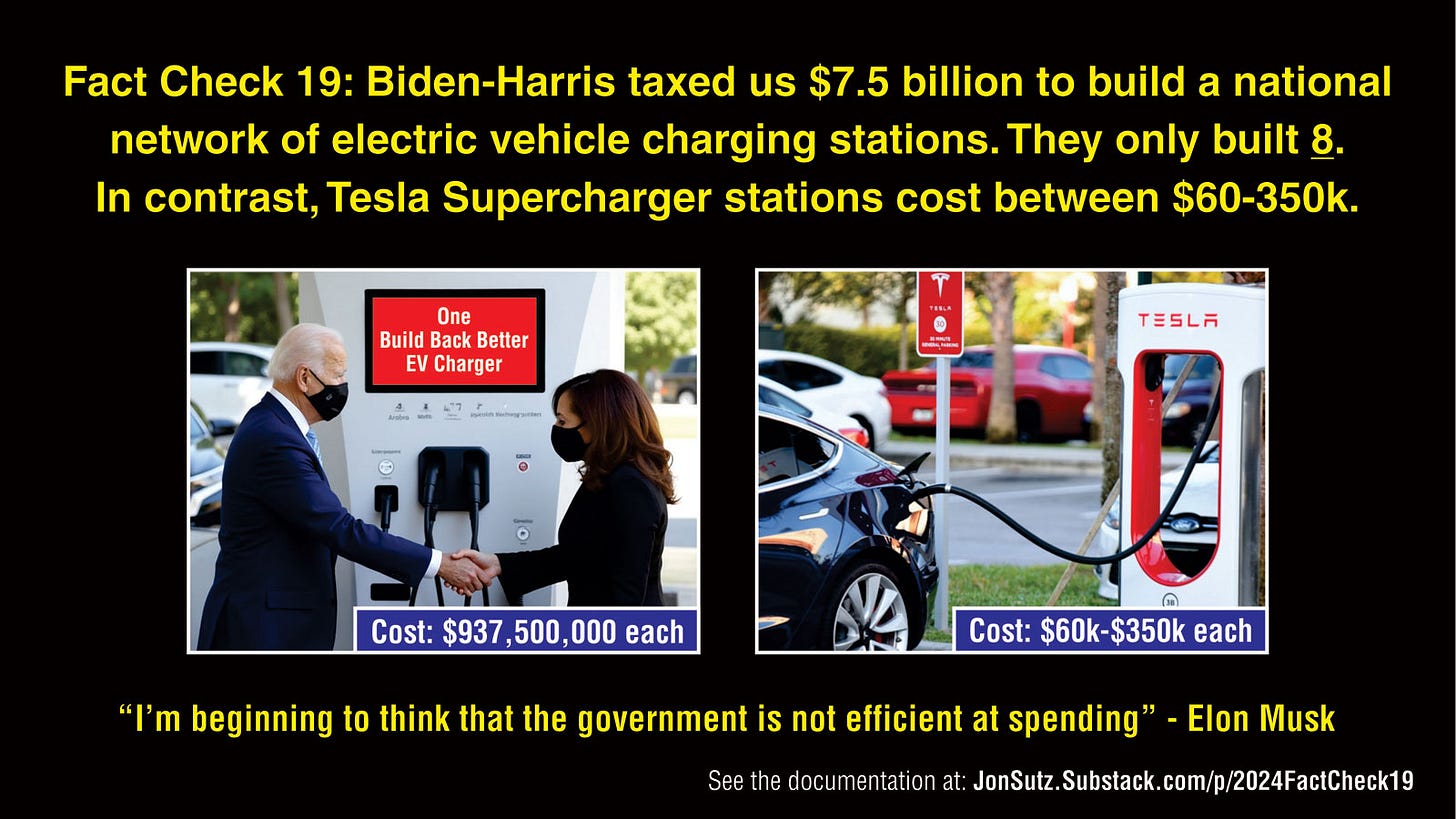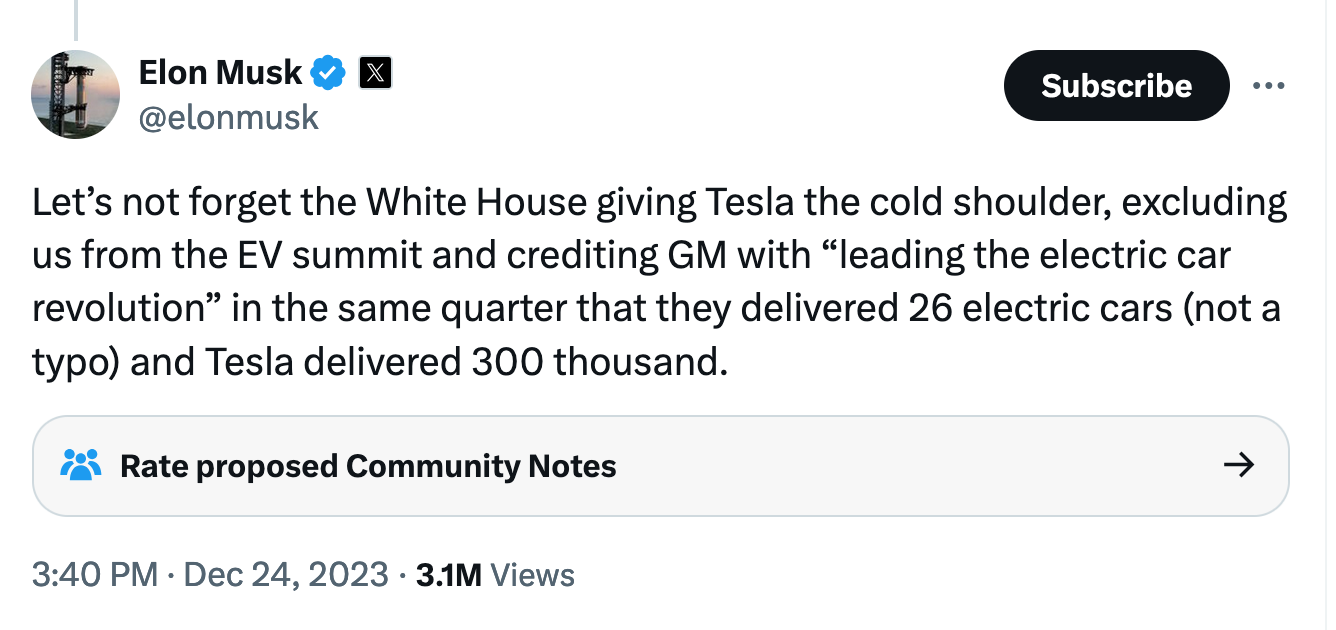Fact Check 19: Biden-Harris taxed us $7.5 billion to build a national network of electric vehicle charging stations. They only built 8.
Government EV charging stations, under Biden-Harris, cost $937 million each. Each Tesla Supercharger station costs $60-350k. Why are most Americans unaware of this outrage, 12 days from the election?
Also see
2024 Fact Check: Introduction - by Jon Sutz
Summary
$7,500,000,000 divided by 8 = $937,500,000 each
According to various reports, the reason for this outrageous cost is “the result of the White House’s diversity, equity, and inclusion initiatives,” and that “all applicants for federal funding must in many cases submit reports that can total hundreds of pages about how they will pursue ‘equity’ every step along the way”
Even Tesla’s most expensive Supercharger station, which costs $350,000, is 1/2,678th the cost of the ones that Biden-Harris built
Sources
Everything You Need to Know About Tesla Supercharger Development Cost, AppInventiv, July 16, 2024. Excerpt:
[T]he Tesla EV Supercharger system development cost is the first thing one would consider when deciding to jump into the EV charging market. To put a number to it, the cost to build an EV charging system like the Tesla supercharger would be somewhere between $60,000 and $350,000
White House 'Equity' Requirements Holding Back EV Charging Station Construction, Internal Docs Show, Washington Free Beacon, June 12, 2024. Excerpt (emphasis added):
In 2021, the Biden administration pledged it would build 500,000 electric vehicle charging stations by 2030. So far, it’s built seven.
Last month, Transportation Secretary Pete Buttigieg—who administers the funds apportioned for EV charger construction in the $1.2 trillion Bipartisan Infrastructure Act—said Americans should not be surprised at the time it takes to stand up "a new category of federal investment."
"It’s more than just plunking a small device into the ground," Buttigieg said in an interview with CBS’s Face the Nation.
But internal memos from the Department of Transportation obtained by the Washington Free Beacon, as well as interviews with those who are responsible for overseeing the implementation of the electric vehicle charging station project, say the delay is in large part a result of the White House’s diversity, equity, and inclusion initiatives.
"These requirements are screwing everything up," said one senior Department of Transportation staffer who spoke on the condition of anonymity. "It’s all a mess." […]
How these equity requirements are relevant to the construction of a single electric vehicle charging station is unclear, Meigs said. But all applicants for federal funding must in many cases submit reports that can total hundreds of pages about how they will pursue "equity" every step along the way.
This leads to delays and increases costs throughout the construction process, one senior Department of Transportation official told the Free Beacon. "Highly Qualified" applications, internal memos state, must "promote local inclusive economic development and entrepreneurship such as the use of minority-owned businesses."
$7.5 Billion in Government Cash Only Built 8 E.V. Chargers in 2.5 Years, Reason, May 30, 2024. Excerpt:
In 2021, the Infrastructure Investment and Jobs Act included $7.5 billion to build 500,000 public charging stations for electric vehicles (E.V.s) across the country in an effort to boost a switch to the use of clean energy.
As Reason reported in December [2023], not one charger funded by the program had yet come online. Now, six months later, the number of functional charging stations has ticked up to eight.
That news comes from an Autoweek article earlier this month. In March, The Washington Post reported that only seven were built; a charging station in Bradford, Vermont, opened in April, containing four E.V. fast chargers. Public chargers are either Level 2, which use alternating current electricity and take several hours to fully charge an all-electric vehicle from empty, or Direct Current Fast Charging (DCFC) superchargers, which use direct current and can charge in less than an hour.
Pete Buttigieg Ridiculed for Joe Biden's $7.5 Billion 'Massive Failure,' Newsweek, May 27, 2024. Excerpt:
U.S. Transportation Secretary Pete Buttigieg was pressed on Sunday about the low number of electric vehicle (EV) charging stations the Biden administration has rolled out across the country over the past three years, with his response garnering criticism and ridicule among social media users.
President Joe Biden signed the Bipartisan Infrastructure Law in November 2021, allocating $7.5 billion for electric vehicle charging. Of this, $5 billion is dedicated to building a network of chargers along major highways, called the National Electric Vehicle Infrastructure program.
While appearing on CBS News' Face the Nation on Sunday, host Margaret Brennan asked Buttigieg, "The Federal Highway Administration says only seven or eight charging stations have been produced with a $7.5 billion investment that taxpayers made back in 2021. Why isn't that happening more quickly?"
Buttigieg responded: "So the president's goal is to have half a million chargers up by the end of this decade. Now, in order to do a charger, it's more than just plunking a small device into the ground. There's utility work and this is also a new category of federal investment. But we've been working with each of the 50 states, every one of them is getting formula dollars to do this work."
Tesla CEO Elon Musk Criticizes Biden Administration's Spending Efficiency On EV Charging Infrastructure: 'Government Is ... Not Efficient At Spending', MooMoo, May 12, 2024. Excerpt:
Musk's Tesla has its own fast charging network. As of the end of the first quarter, the company had over 6000 supercharger stations around the globe and over 57,000 connectors. Earlier this year, the company also opened over 15,000 of its superchargers across North America to non-Tesla EV owners.
Earlier this week, Musk said that the company would spend over $500 million to expand its network this year, not including operation costs, and create thousands of new chargers.
$7.5 Billion in Federal Funds Yield Only 8 EV Charging Stations; More than two years later, electric vehicles remain a political football. The Biden administration says it takes time to get it right, AutoWeek, May 7, 2024. Excerpt:
The Biden Administration’s $7.5 billion effort to jump-start the electric-vehicle charging landscape is moving very, very slowly. Now more than two years after the program was signed into law in late 2021, only eight chargers have been put in place.
In April, with some fanfare, cars plugged into a station in Bradford, Vermont. Defenders encourage patience, saying the pace will quicken rapidly later this year.
The allocated dollars are $5 billion through the National Electric Vehicle Infrastructure (NEVI) program and $2.5 billion in Charging and Fueling Infrastructure (CFI) discretionary grant funding via the Infrastructure Investment and Jobs Act.
From Elon Musk: More indications of the galactic performance difference between the Biden-Harris administration and Tesla
May 10, 2024
December 24, 2023
March 1, 2022
Subscribe
If you value the 2024 Fact Check infographic report series, subscribe below to receive each new one via email until Election Day, and share this post on social media:






